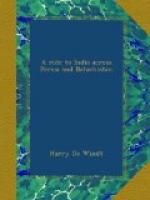Popular as he is with the lower orders, the Zil-i-Sultan does not, when offenders are brought before him, err on the side of mercy. Persian justice is short, sharp, and severe, and a man who commits a crime in the morning, may be minus his head before sunset. Although a Persian would indignantly deny it, some of their punishments are nearly as cruel as the Chinese. For instance, not so very long ago a man in Southern Persia was convicted of incest, for which crime his eyes were first torn out with pincers, and his teeth then extracted, one by one, sharpened to a point, and hammered, like nails, through the top of his skull. It should be said in justice that the present Shah has done all he can to stop the torture system, and confine the death-sentence to one of two methods—painless and instantaneous—throat-cutting and blowing from a gun. Notwithstanding, executions such as the one I have mentioned are common enough in remote districts, and crucifixion, walling up, or burying and burning alive are, although less common than formerly, by no means out of date. Women are usually put to death by being strangled, thrown from a precipice or well, or wrapped up in a carpet and jumped upon; but the execution of a woman is now, fortunately, rare in Persia.
A dreary desert surrounds Ispahan on every side save to the southward, where dark masses of rock, a thousand feet high, break the sky-line. The environs of the city are well populated, and, as we rode out, en route for Shiraz, we passed through a good deal of cultivated land. This is irrigated by the Zandarood, whose blue waters are visible for a long distance winding through the emerald-green plain, with its gay patchwork of white and scarlet poppy-gardens. The cultivation of this plant is yearly increasing in Persia, for there is an enormous demand for the drug in the country itself, to say nothing of the export market, the value of which, in 1871, was 696,000 rupees. In 1881 it had progressed to 8,470,000 rupees, and is steadily increasing every year. Opium is not smoked in Persia, but is taken in the form of pills. Many among the upper classes take it daily, the dose being a grain to a grain and a half.
We covered, the first day out from Ispahan, nearly a hundred miles between sunrise and 10 p.m.—not bad work for Persia. A little after dark, and before the moon had risen, I was cantering easily along in front of Gerome, when a violent blow on the chest, followed by another between the eyes, sent me reeling off my horse on to the sand. My first thought, on collecting myself, was “Robbers!”—this part of the road bearing an unpleasant reputation. Cocking my revolver, I called to Gerome, and was answered by a volley of oaths, while another riderless horse galloped past me and disappeared in the darkness. Our foe was a harmless one. The wind had blown down one of the telegraph-posts, and the wires had done the mischief. By good luck and the aid of lucifer matches, we managed to trace our ponies to a piece of cultivated ground hard by, where we found them calmly feeding in a field of standing corn.




